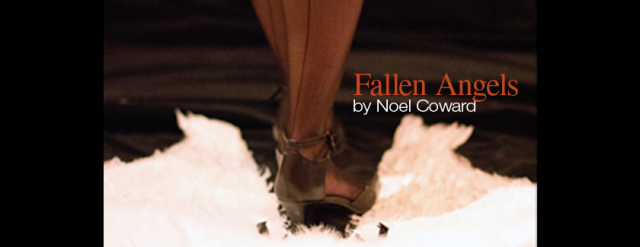Noël Coward’s Fallen Angels (at Theater Schmeater through December 15; tickets) is a lightly amusing and decidedly uneven show, which loses a lot because of its weakness in set and costume details, a weakness which could be overlooked were it otherwise more engaging.
The story–plot is too strong a word for this show–concerns a pair of friends anticipating the arrival of an old flame with whom each has had a premarital affair. The second act is the highlight of the evening as drink, anxiety, expectation, and rivalry tear apart the women. The third act catapults the remains beyond the reach of reason and into the ether of farce.
The most consistent qualities in this production are the British accents (coached by Teresa Thuman) and the performance of Marianna de Fazio. De Fazio holds the show together by sheer will in the lead role of Julia Sterroll. She seems to have a calming effect on most of the rest of the cast. The longer an actor’s scene with her, the more he seems to relax into his part and maintain an effective scale.
Tim Moore as Julia’s husband, Fred, is the least susceptible to this tendency. He consistently telegraphs everything through a rubbery face that animates when he’s speaking and falls still when it’s someone else’s line. Erin Stewart as their maid, Saunders, is more forgivable given her character’s eccentricity. The maid she plays might be a relation of Darragh Kennan’s waiter in ACT’s Pinter Festival production of Celebration (and suffers in comparison). James Weidman and Sara Trowbridge are the most easily swayed in their performances as the Fred-and-Ethel neighbors.
Despite a few chorus line arrangements director Corey McDaniel keeps his actors moving around the functional set and the pacing never flags. The two intermissions are timely and the second act booze-up should encourage stiff business at concessions.
Much theatre design and construction relies on the masking of the fifteen foot rule: If it can’t be seen from 15 feet away it doesn’t exist. At Theater Schmeater, fifteen feet is a bit less than the distance from the back of the house to the back of the stage so there is no room for error. Every detail will either contribute to or detract from the show. While there are a few banks of miniature portraits on various surfaces, for the most part the set feels decidedly underdressed without so much as a rug or a picture on the wall. The drinks all look a bit off-color and the piano, while clever, is too obvious to display.
Julia Evanovich’s costumes are questionable to the point of distracting from the play. The men go golfing in high-hemmed trousers attempting to masquerade as plus-fours but without the cinched bottoms. Costumes give mixed messages about the season right up until the end of the play when Maurice enters in a mismatched suit of off-white clothes and a panama hat. De Fazio gets the best of the costumes in a couple of Asian-cut ensembles. Her luck fades in the final act when she becomes the victim of the evening’s biggest costume gaffe. A comic bit referring to her costume fails when words and design do not match.
Most of these technical problems might go unnoticed in a larger space but then we’d also lose the delightful intimacy of de Fazio’s performance. One hopes that she and McDaniel will have ample opportunity to fill Seattle’s small spaces and large theatres in the future.
